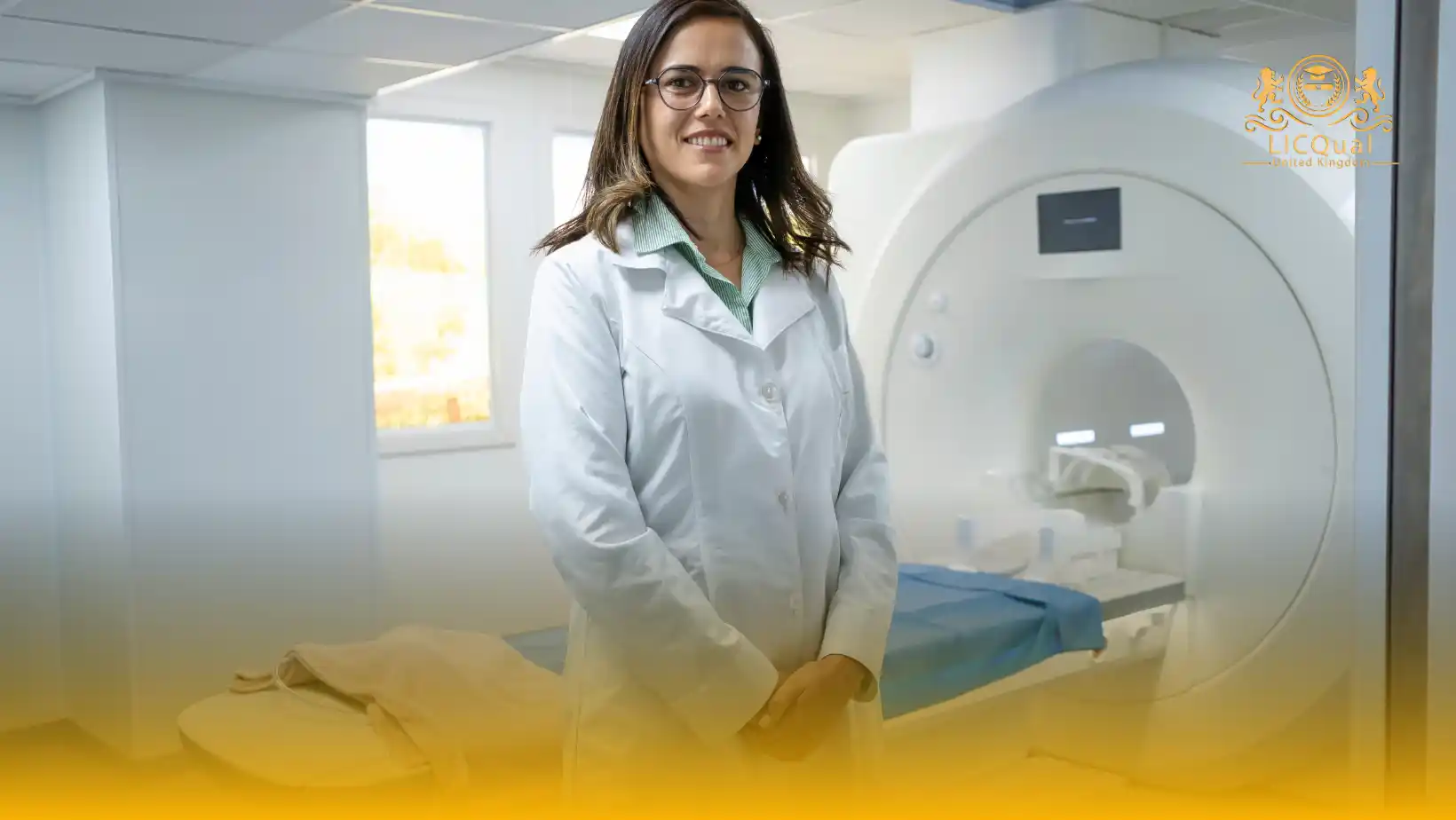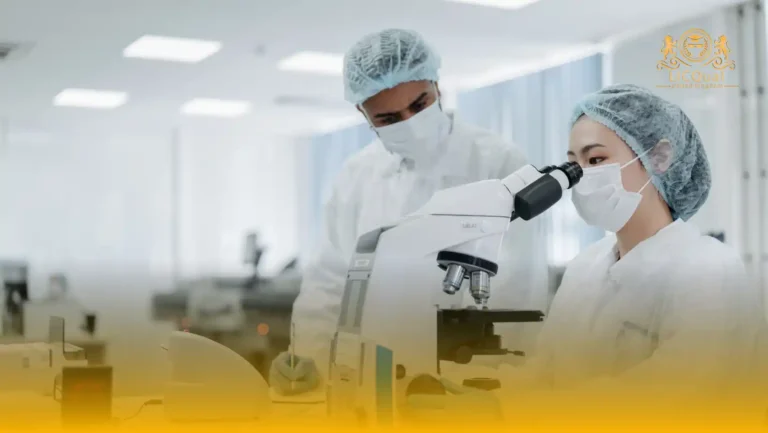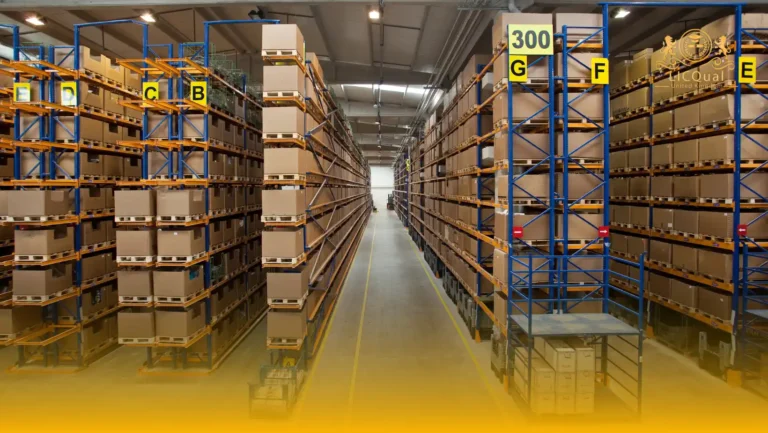The LICQual Level 7 Postgraduate Diploma in Nuclear Medicine (PgDNM) is an advanced qualification designed for experienced healthcare professionals seeking to deepen their expertise in nuclear medicine, medical imaging, and radiopharmaceutical applications. This course is not intended for fresh entrants but is ideal for nuclear medicine practitioners, radiologists, medical physicists, technologists, and other healthcare professionals who wish to enhance their career prospects, expand their knowledge, and strengthen their Continuing Professional Development (CPD).
Learners will gain comprehensive knowledge of nuclear medicine principles, diagnostic and therapeutic radiopharmaceutical techniques, imaging technologies, patient safety, and the clinical application of nuclear medicine in disease management. The curriculum emphasises the integration of theoretical knowledge with practical experience, enabling learners to interpret complex imaging data, optimise treatment planning, and contribute effectively to multidisciplinary healthcare teams.
Centres delivering this qualification are required to employ competent and qualified staff, supported by state-of-the-art imaging facilities, laboratories, and comprehensive learning resources. This ensures learners receive expert guidance, hands-on experience, and academic support necessary for successful completion of this advanced programme.
Upon completion, learners will be equipped to assume leadership roles in nuclear medicine services, contribute to clinical research, and implement best practices in imaging and radiopharmaceutical applications. This qualification represents a significant step for professionals committed to excellence, advanced clinical practice, and career progression in nuclear medicine.
Course Overview
Qualification Title
LICQual Level 7 Postgraduate Diploma in Nuclear Medicine (PgDNM)
Total Units
6
Total Credits
120
GLH
600
Qualification #
LICQ2200980
Qualification Specification
To enroll in the LICQual Level 7 Postgraduate Diploma in Nuclear Medicine (PgDNM), applicants must meet the following criteria:
|
Qualification# |
Unit Title |
Credits |
GLH |
|---|---|---|---|
|
LICQ2200980-1 |
Principles of Nuclear Medicine |
20 |
100 |
|
LICQ2200980-2 |
Diagnostic Nuclear Medicine Techniques |
20 |
100 |
|
LICQ2200980-3 |
Therapeutic Nuclear Medicine |
20 |
100 |
|
LICQ2200980-4 |
Imaging Instrumentation and Technology |
20 |
100 |
|
LICQ2200980-5 |
Research Methods and Evidence-Based Nuclear Medicine |
20 |
100 |
|
LICQ2200980-6 |
Professional Practice, Ethics, and Continuing Development |
20 |
100 |
By the end of this course, learners will be able to:
Unit 1: Principles of Nuclear Medicine
By the end of this unit, learners will be able to:
- Analyse the fundamental principles of nuclear medicine and radiopharmaceutical science.
- Evaluate radiation physics, radiobiology, and safety protocols in clinical practice.
- Demonstrate understanding of radiopharmaceutical production, quality control, and regulatory requirements.
- Apply ethical and professional standards in the practice of nuclear medicine.
Unit 2: Diagnostic Nuclear Medicine Techniques
By the end of this unit, learners will be able to:
- Demonstrate comprehensive knowledge of PET, SPECT, and gamma camera imaging techniques.
- Interpret functional imaging studies and correlate findings with clinical presentations.
- Apply nuclear medicine imaging in cardiology, oncology, neurology, and other clinical specialties.
- Critically evaluate emerging diagnostic techniques and their application in patient care.
Unit 3: Therapeutic Nuclear Medicine
By the end of this unit, learners will be able to:
- Apply principles of radionuclide therapy for various clinical conditions.
- Plan and deliver personalised dosimetry-based treatment for patients.
- Monitor and manage patient response to nuclear medicine therapy safely and effectively.
- Integrate evidence-based approaches to optimise therapeutic outcomes.
Unit 4: Imaging Instrumentation and Technology
By the end of this unit, learners will be able to:
- Demonstrate detailed understanding of nuclear medicine instrumentation and imaging hardware.
- Utilise software tools for image acquisition, processing, and analysis.
- Conduct quality assurance and performance evaluations for imaging equipment.
- Integrate nuclear medicine imaging with complementary modalities such as CT and MRI.
Unit 5: Research Methods and Evidence-Based Nuclear Medicine
By the end of this unit, learners will be able to:
- Design and conduct advanced research projects in nuclear medicine.
- Critically appraise scientific literature and apply evidence-based findings to clinical practice.
- Apply statistical analysis and research methodology to interpret study outcomes.
- Demonstrate ethical and professional conduct in nuclear medicine research.
Unit 6: Professional Practice, Ethics, and Continuing Development
By the end of this unit, learners will be able to:
- Demonstrate professional responsibilities and adhere to clinical governance in nuclear medicine.
- Apply ethical and legal frameworks in clinical and research practice.
- Lead and collaborate effectively within multidisciplinary healthcare teams.
- Develop strategies for Continuing Professional Development (CPD) and reflective practice.
The LICQual Level 7 Postgraduate Diploma in Nuclear Medicine (PgDNM) is ideal for healthcare professionals who want to expand their expertise in advanced diagnostic imaging and medical technology. Whether you are an experienced practitioner or an aspiring specialist, this program provides the perfect blend of theory, research, and applied practice. It is designed for individuals seeking international recognition, professional growth, and leadership roles in nuclear medicine and imaging science.
Medical Doctors and Physicians
- Enhance your clinical decision-making in diagnostic imaging.
- Gain expertise in interpreting complex nuclear scans and results.
- Strengthen your understanding of radiopharmaceutical applications.
- Advance your qualifications with a globally recognized postgraduate diploma.
- Develop leadership skills for hospital and research environments.
Radiologists and Imaging Specialists
- Master advanced nuclear imaging techniques and protocols.
- Learn to integrate nuclear medicine with other diagnostic tools.
- Improve diagnostic accuracy through evidence-based approaches.
- Gain professional credibility through the LICQual PgDNM course.
- Expand your career opportunities in hospitals and medical centers.
Nuclear Medicine Technologists
- Deepen your technical knowledge of nuclear medicine operations.
- Learn advanced radiation safety and handling procedures.
- Strengthen your analytical and patient care skills.
- Build global qualifications to enhance your professional profile.
- Prepare for supervisory or specialist positions in imaging departments.
Biomedical Scientists and Researchers
- Explore the molecular and cellular aspects of nuclear imaging.
- Contribute to innovations in radiopharmaceutical development.
- Participate in cutting-edge clinical and laboratory research.
- Collaborate with multidisciplinary healthcare teams worldwide.
- Gain academic and professional recognition through Level 7 study.
Healthcare Administrators and Managers
- Understand the strategic importance of nuclear medicine services.
- Learn effective management of imaging departments and resources.
- Develop policies ensuring radiation safety and quality assurance.
- Strengthen leadership skills in hospital administration.
- Support evidence-based decision-making and clinical governance.
Academic and Teaching Professionals
- Expand your academic portfolio with specialized knowledge.
- Incorporate nuclear medicine principles into medical education.
- Mentor and train the next generation of medical imaging professionals.
- Publish and present research in international conferences.
- Enhance your institutional reputation with an accredited qualification.
International Medical Graduates and Specialists
- Earn a UK-recognized diploma in nuclear medicine to boost global mobility.
- Adapt to international standards in diagnostic imaging and healthcare.
- Strengthen your credentials for licensure and specialist recognition.
- Access flexible study options to suit your career and location.
- Join a network of global healthcare professionals and experts.
Centres delivering the LICQual Level 7 Postgraduate Diploma in Nuclear Medicine must adhere to rigorous standards to ensure high-quality education and learner success. Key requirements include:
- Qualified and Experienced Staff: All teaching and assessment personnel must be highly qualified in nuclear medicine, radiology, medical physics, or related healthcare disciplines, with extensive clinical and academic experience.
- State-of-the-Art Facilities: Centres must provide access to nuclear medicine laboratories, imaging suites, radiopharmacy facilities, and practical training environments essential for advanced study.
- Comprehensive Learning Resources: Learners should have access to textbooks, academic journals, case studies, digital learning platforms, and other resources supporting in-depth study and research.
- Practical Training Opportunities: Centres must facilitate hands-on exercises, imaging simulations, radiopharmaceutical handling, and case-based learning relevant to nuclear medicine practice.
- Robust Assessment and Evaluation: Centres must implement rigorous assessment strategies, including written assignments, research projects, and practical evaluations, to ensure learners achieve all learning outcomes.
- Ethical and Legal Compliance: Centres must adhere to professional, ethical, and legal standards in nuclear medicine education and clinical practice.
- Support for Continuing Professional Development (CPD): Centres should provide guidance for ongoing CPD, reflective practice, and professional development, enabling learners to apply advanced knowledge in clinical settings.
Meeting these requirements ensures learners receive world-class instruction, practical experience, and academic support, preparing them for leadership and advanced practice in nuclear medicine.
Assessment and Verification
All units within this qualification are subject to internal assessment by the approved centre and external verification by LICQual. The qualification follows a criterion-referenced assessment approach, ensuring that learners meet all specified learning outcomes.
To achieve a ‘Pass’ in any unit, learners must provide valid, sufficient, and authentic evidence demonstrating their attainment of all learning outcomes and compliance with the prescribed assessment criteria. The Assessor is responsible for evaluating the evidence and determining whether the learner has successfully met the required standards.
Assessors must maintain a clear and comprehensive audit trail, documenting the basis for their assessment decisions to ensure transparency, consistency, and compliance with quality assurance requirements.







